BORO ĐUKIĆ, PUTIN’S HOUND IN PODGORICA
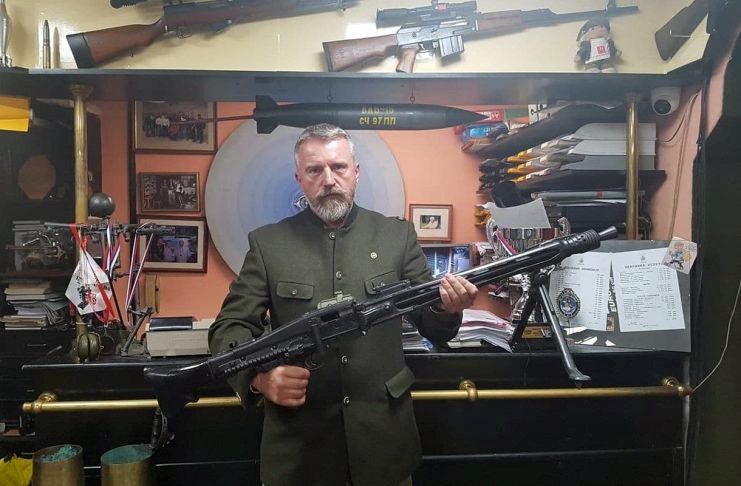
Montenegro, with a surface area of just over 14,000 km2 and a population of almost 650,000, is perhaps one of the countries with the most troubled history on the Balkan peninsula: at the centre of centuries of aggression, internal conflicts, regional rivalries, bloody wars, proud rejections and bloody liberations, it still seems unable to find its centre of gravity.
The last conquest of independence was on 21 May 2006 when, in a democratic referendum contest and with a meagre 55.5% margin (55% is the percentage the EU requires for victory), it managed to separate from Belgrade. The result of the referendum, despite running on a razor’s edge, is nevertheless recognised: Serbia is one of the first nations to take note, followed by Russia, the European Union, the United States and the other Balkan neighbours, such as Croatia, Slovenia and Bosnia-Herzegovina, whose paths to independence lead to the slow and bloody dissolution of the former Yugoslavia.
Since then, a whirlwind succession of events has changed the face of the country: in the autumn following the referendum, the first democratic parliamentary elections saw the victory of the Coalition for a European Montenegro, formed by the Democratic Party of Socialists of Montenegro (DPS) and the Social Democratic Party of Montenegro (SDP); Milo Đukanović was confirmed prime minister. It was a bitter defeat for the nationalist coalition, formed by the pro-Serbian parties (the Serbian People’s Party SNS and the Serbian Radical Party SRS) and the People’s Socialist Party of Montenegro (SNP): from then on, the dynamics of the country’s rapprochement with the West became unstoppable and Russia, which with the liberalisations that had taken place after the collapse of communism had got its hands on a large share of the business activities of this state (in 2012 Monstat, the national institute of statistics in Podgorica, states that around one third of the shares of foreign companies in Montenegro are owned by Russian businessmen[1] while tourism remains one of the main items in economic exchange, mitigated only by the Covid epidemic and subsequent sanctions[2] ), does not like the direction taken at all.
But Montenegro continues unstoppably on its way: between the end of 2006 and the first months of 2007, Montenegro is admitted to the International Monetary Fund[3] and to NATO’s Partnership for Peace programme[4] . The first negotiations for association with the EU are also undertaken, leading to the signing of the Stabilisation and Association Agreement in October 2007[5] . On 2 December 2015 Montenegro is invited to join NATO[6] , on 28 April 2017 Montenegro’s parliamentarians support the NATO treaty – not without protest[7] , and on 5 June 2017 the parliament ratifies its accession[8] : politics has an easy ride, the 2016 elections again see the victory of Milo Đukanović, supported by the independence coalition formed by the Democratic Party of Socialists (DPS) and the Liberal Party (LP), while the loser is Andrija Mandić’s pro-Russian Democratic Front formation: the elections, however, are tainted by widespread allegations of fraud and vote buying, but are nevertheless validated[9] .
In addition, the hypothesis of an attempted coup d’état is emerging, but it has the appearance of a mystery: the paternity of the attempted coup is immediately assigned to pro-Russian Serbs and the authorities formally accuse some twenty people, including several Serbian nationalists calling themselves ‘Night Wolves’ who are pushing for a pro-Russian government[10] . Their leader is said to be a former head of the Gendarmerie of Serbia’s Ministry of Internal Affairs, Bratislav Dikic, who is accused of creating a terrorist group to target Đukanović[11] . But the Serbian conspiracy trail is not convincing: investigations lead to former Prime Minister Radojica Rajo Bozovic (former commander of the infamous ‘Red Berets’, cited by the International Criminal Tribunal for the former Yugoslavia and arrested several times for various offences), who is alleged to have played a decisive role in the preparation of the coup: Bozovic is, however, a good friend of Đukanović’s, and he himself is said to have asked him to orchestrate the fake coup and shift the blame onto the Serbs and the opposition to the regime[12] .
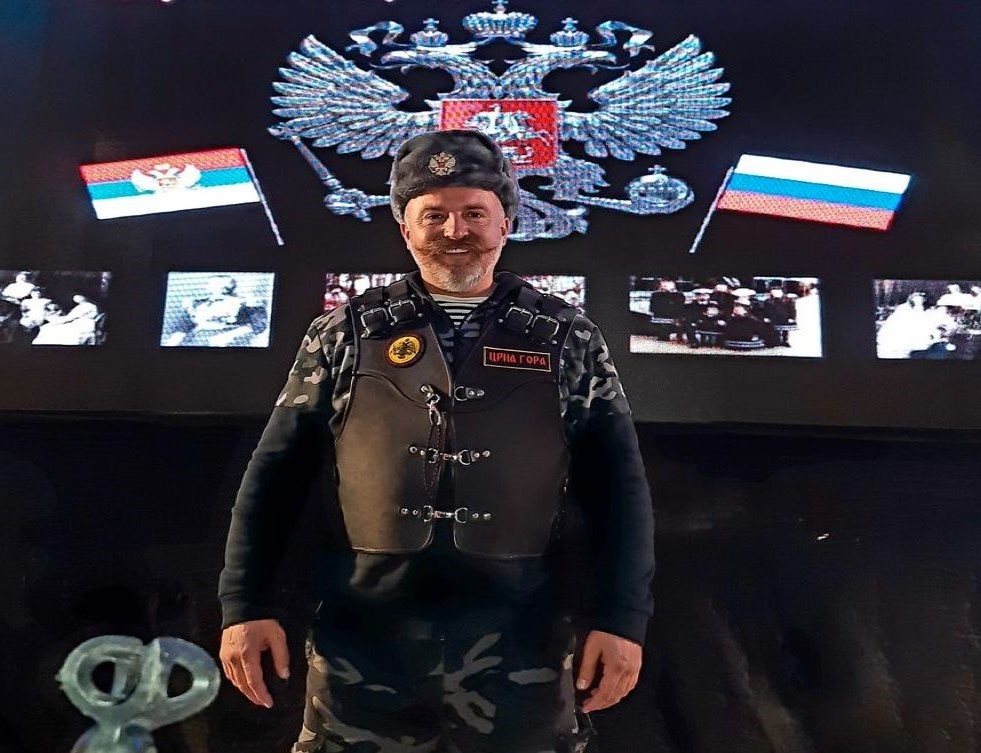
Russia implements its soft power strategy with honorary consuls, who have diplomatic privileges on their side: in the photo former honorary consul for Montenegro Boro Đukić[13]
Among those being investigated for espionage is Joseph Assad, who is accused of being responsible for the escape abroad of coup plotters hypothetically in agreement with the Russian government[14] , but even here something does not add up: Joseph Assad is an Egyptian Christian who grew up in Lebanon and Egypt and later became a naturalised US citizen, studied at Palm Beach Atlantic University in Florida and joined the CIA in 1999 together with his American wife (the two became well known in 2015 after having already left the CIA, when they helped 149 Iraqi Christians threatened by the Islamic State to flee to Europe[15] ). According to the indictment, Assad planned the coup in Florida with Brian Scott, a former CIA agent and president of the security company Patriot Defense Groupe, then left for Montenegro to carry it out: that the hand of the US government was behind it all is a hypothesis widely thrown around by the pro-Russians, obviously rejected by the pro-Westerners. Among those under investigation are four former FBI agents: Ladislao Karbaljos, John Joseph Paolo, Scot Rivas and Horhe Mijar[16] .
In May 2019, the Montenegrin court convicts 14 people, including two Russian military intelligence officers Eduard Shishmakov and Vladimir Popov, two pro-Russian Democratic Front leaders Andrija Mandic and Milan Knezevic, nine Serbian citizens and another Montenegrin, all guilty, according to the prosecution, of attempting to overthrow the government in 2016[17] ; in February 2021, however, the Court of Appeals annuls the first instance verdicts issued due to serious procedural violations: the trial has to be re-tried, and to date it has not been concluded[18] .
The reality is that Montenegro is experiencing a political situation where the pro-Western majority party has counted seats and is forced to govern in constant negotiations with the minority parties; civil society is divided, corruption is sky-high (Transparency International ranks Montenegro 65th out of 180 countries, with a meagre score of 45/100[19] ), but above all, there is constant pressure from Russia, which is using all its weapons[20] to implement a hammering anti-Western propaganda in an attempt to keep its hands on the country: a situation of extreme instability where, in addition to a creeping cold war, fierce internal disputes also dominate.
Montenegro is also the crossroads of numerous illicit trafficking operations and this, combined with poor protection and respect for human rights and freedoms, makes the country’s path towards the European Union rather complicated. According to a report compiled in 2019 by the Organised Crime and Corruption Reporting Project, Montenegro is a veritable ‘washing machine’ for the Russian mafia’s dirty money[21] . One of the control techniques used by Moscow is the use of its emissaries disguised as honorary consuls.
A solid bridge between Russia and Montenegro
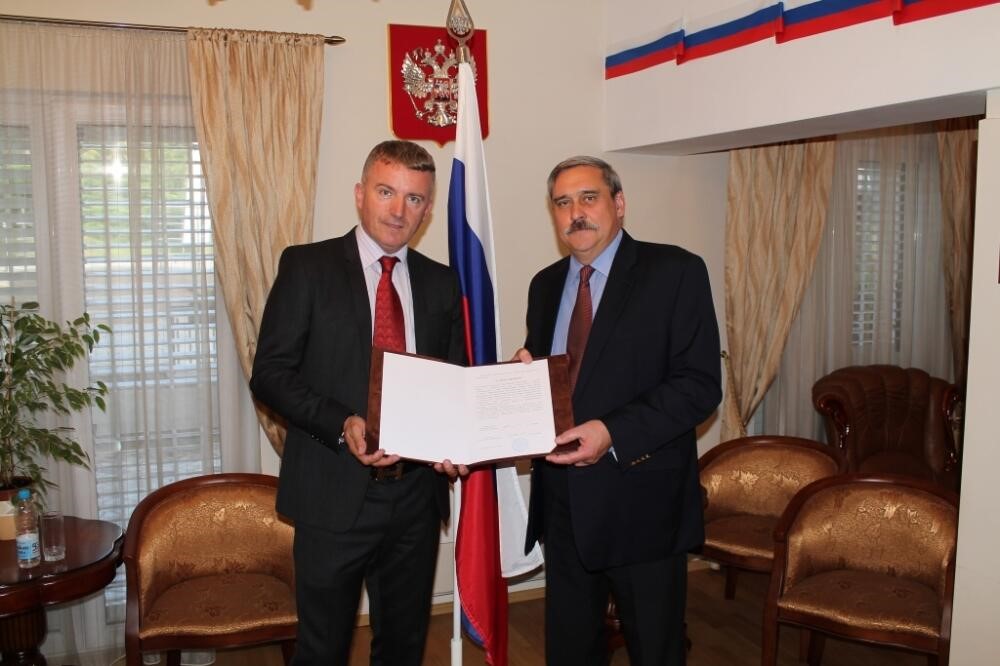
Boro Đukić receives the certificate of Honorary Consul from the Russian Ambassador to Montenegro Andrej Nesterenko[22]
Boro Đukić was born in 1970 in Podgorica. After working as a sales manager in a tobacco factory in Montenegro, his father became the diplomatic and commercial representative of the Socialist Federal Republic of Yugoslavia in Moscow, to which he moved with his family. Đukić began studying economics at the Plekhanov Academy in Moscow and, after graduating, began working as a representative for an Austrian company, first in Moscow, then in Alma-Ata (today Almaty, Kazakhstan).
In 1998, he returned to Montenegro and became an advisor at the Ministry of Foreign Affairs. In 1999, he enrolled at the Diplomatic Academy of the Ministry of Foreign Affairs in Moscow, concluding his studies with his doctoral thesis in 2002 at the Department of International Economics (whose rector is Yevgeniy Primakov, Russian Prime Minister from 1998 to 1999, Foreign Minister, Chairman of the Supreme Soviet of the Soviet Union and Head of the Secret Service)[23] .
After making money in Russia – although there is no evidence of how[24] – in 2013 Boro Đukić returns to Montenegro and Ukraine appoints him honorary consul in Montenegro, but it is a post that lasts only a few months: Đukić explains that the decision to leave is due to changes in the Ukrainian leadership in 2014[25] . The same post, however, is renewed soon after, in the same year, but this time by Russia[26] .
Đukić proves to be a particularly active honorary consul, even though many of his activities take place in gross violation of the Vienna Convention, mainly Article 41, which states that diplomatic representatives may not interfere in the internal affairs of another state: in October 2017, as honorary consul, he helps Marko Milačić, his friend, to travel to Moscow[27] . Milačić is one of Montenegro’s most prominent populist politicians and spends much of his energy against Montenegro’s NATO membership[28] , he is the founder of the non-governmental organisation Movement for the Neutrality of Montenegro, belongs to Mladen Bojanić’s Resistance to Hopelessness (OB) – an anti-establishment and anti-NATO political movement -, is a member of the Democratic Front (DF) electoral list for the 2016 parliamentary elections, and is convicted of organising an unauthorised protest[29] and burning a NATO flag in the square[30] .
In Moscow, Milačić meets with a member of the State Duma’s International Affairs Committee, Sergei Zheleznyak – one of Putin’s main allies and under sanctions by the United States for his involvement in the annexation of Crimea – he returns to Montenegro and, two months later, together with Djukic, founds the right-wing political party Real Montenegro (Prava Crna Gora): the party’s official headquarters is none other than Đukić’s personal villa[31] . Đukić gets busy sponsoring the new party, in an interview he reveals: ‘If I had a few million euros or dollars, I would offer them to Mr Milačić, I like his idea’ and soon appears publicly alongside Milačić himself during the election campaign[32] .
The consul’s anti-Western ideas are no longer a mystery: he never fails to be photographed with Alexander Zaldostanov, known as ‘the surgeon’, leader of the Night Wolves[33] , a paramilitary group sanctioned by the European Union and the United States that has close relations with the Kremlin, from which they are financed, very active in the Balkans and Eastern Europe, present on the side of the pro-Russian side in the Donbass war, strongly involved with the Russian Orthodox Church[34] .
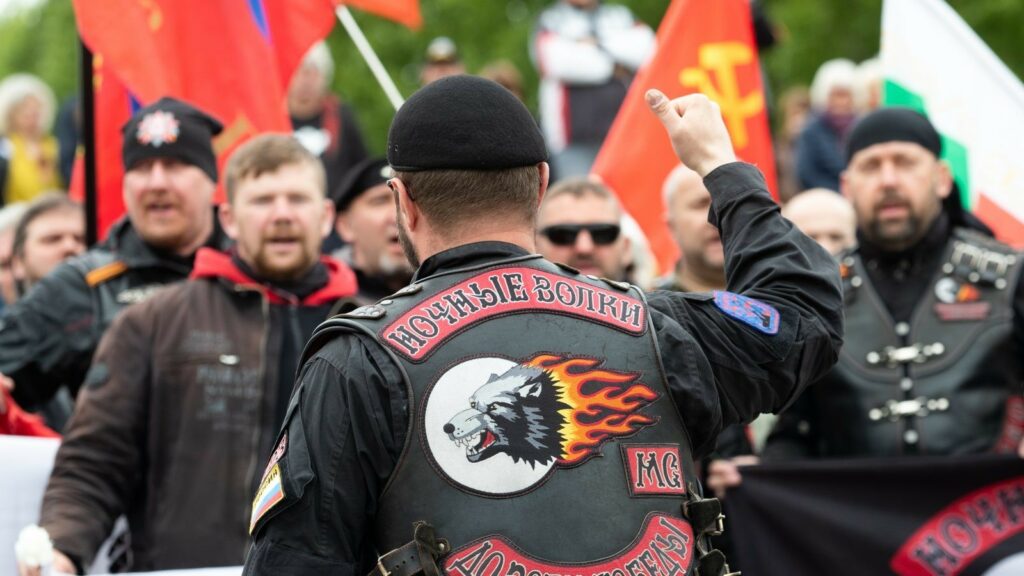
Serbian Black Wolves, men ready for anything and loyal to, Vladimir Putin[35]
Đukić is also an admirer of the new ‘Army of the Cossacks’ in Montenegro, or Kozacka vojska (his Facebook profile is full of pictures of him wearing their traditional uniform), a paramilitary group that inherits the ancient Cossack tradition and expresses itself in the Balkans with a formation called ‘Balkanska kozačka armija’[36] made up largely of Serbs and Montenegrins who aim to fight Western values: the hallmarks are militarism, the Orthodox religion and the motto ‘always with Russia, never against Russia’ and the main activity is to fight against Podgorica’s entry into NATO[37] .
The head of analysis of the Digital-Forensic Center-DFC, Lubomir Filipović, claims that Đukić is a coordinator of the Montenegrin branch of the Russian extreme right-wing Sorok Sorokov[38] , an ultra-nationalist Orthodox militia born within the Patriarchate, which has direct contacts with Patriarch Kirill of Moscow and enjoys the support of influential figures such as Tikhon Shevkunov, an Orthodox Christian monk who is Putin’s confessor and firmly connected to the security services[39] . The primary mission of the Sorok Sorokov movement is the defence of the Russian Orthodox Church and the spread of a racist, homophobic, anti-Western culture[40] .
Đukić is very active on social networks[41] where he flaunts his boundless love for Russia[42] and the Orthodox Church, appears in numerous photos in the proud company of the religious leaders of Montenegro, Serbia and Russia[43] and in many where he celebrates his friendship mixed with veneration for Amfilohije[44] ; There are also many photos where he boasts of his passion for weapons, his closeness to pro-Russian paramilitary groups, his hatred for NATO and the United States, his world travels (Moscow, St. Petersburg, Belgrade, Dubai, Kamchatka, Istanbul, Amsterdam), his fishing trips and many, many photos of his close-ups, everywhere and perpetually smiling, testimonies that turn his Facebook page into a showcase with a strong propagandist and narcissistic flavour.
The Skripal case and Đukić’s suspension

Boro Đukić with Marko Milačić at a press conference during which he expressed his disappointment at Montenegro’s decision to expel a Russian diplomat and suspend its consulate[45]
On 4 March 2018, Serghej Skripal and his daughter Yulia are found semi-conscious, due to poisoning, on a bench in Salisbury: the affair is immediately compared to the Litvinenko case, where the former FSB agent was killed in London in 2006 poisoned by tea ‘laced’ with polonium. Sereghej Skripal is a Russian military officer and secret agent who was a double agent for the UK intelligence services in the 1990s and early 2000s. Captured in 2004 by the Russian federal security services and tried, he was sentenced to 13 years in prison for high treason, only to return to the UK in 2010 thanks to a spy swap[46] .
Serghej Skripal and his daughter Yulia manage to survive the poisoning that will be ascertained to have originated from the nerve agent Novichok, a gas developed in the Soviet Union in the 1970s and 1980s, and their survival gives a fundamental turning point to the investigation that will establish the Russian government’s responsibility: Prime Minister Theresa May announces, in retaliation, the expulsion of 23 Russian diplomats[47] .
The situation for Russian diplomats immediately became red-hot in all Western countries: in March 2018, the Montenegrin Minister of Foreign Affairs decided to expel a diplomat of Russian nationality and to permanently suspend Boro Đukić, on whose head also hangs the recent accusation of being the co-founder of the right-wing ultranationalist party Prava Crna Gora (Real Montenegro), from his work as a consul. The decision is judged scandalous by Đukić, who is convinced that he does not deserve to be treated in this way at all, claims it is ‘anti-Russian hysteria’[48] , but Prime Minister Duško Marković declares that the decision follows EU foreign policy and is in solidarity with NATO members[49] .
Dismissed from his post, Đukić continued his political activities in support of Marko Milačić, anti-Western paramilitary structures and the Orthodox Church[50] and, on 19 February 2020, his name once again made headlines: the Montenegrin border police seized a package containing 100 badges, probably fake, of the International Police Association (IPA) and bearing his name as the recipient; on the badges themselves the words ‘Russian section’[51] .

Members of the Orthodox Christian Sorok Sorokov movement wiping their feet on an LGBT flag in front of the US Embassy in Moscow on 1 July 2020[52]
The package is found on a bus, the driver of which recounts that he received it from an unknown person who, in exchange for a sum of money, asked him to deliver it to Podgorica, giving him the addressee’s contact details and explaining that the contents consisted of some “family documents”[53] . The contacts lead to Boro Đukić who, on learning of the kidnapping, switches off his phone, buys a plane ticket and flees to Moscow[54] . After a later check, the special chief prosecutor of Montenegro, Milivoje Katnić, will claim that these are original badges but without the progressive number[55] .
Đukić does not give up and claims that he is being persecuted[56] : Ivan Sardak, lieutenant general of the police and president of the Moscow regional department of the IPA, claims that he sent the hundred badges to his Montenegrin colleagues and had them made in Serbia because they were cheaper and better made, so the former consul would be totally uninvolved in the operation[57] , but in the meantime, the Montenegrin authorities issue an arrest warrant against him: Đukić is a wanted man[58] .
There is no peace for Đukić: in October 2021, during his exile in Russia, he became involved in the Dmitry Zakharchenko case and was indicted by the Investigative Committee of the Russian Federation for perjury. Zakharchenko is a former deputy head of the Russian Interior Ministry’s Economic Security and Anti-Corruption Bureau, who was arrested for corruption in 2016 and sentenced in 2019 to 13 years in prison. Đukić, testifying before the court, claims that he granted a loan to former investigator in the transport department of the Investigative Committee of Russia (TFR) Ivan Kozhevnikov in the amount of 185 million roubles and received 5.5 million roubles for the service; The investigation revealed that this was in fact money from the property of FSB Colonel Dmitry Senin, who disappeared immediately after Zakharchenko’s arrest and who gave away all his considerable assets, the fruit of bribes, to relatives and friends, including Kozhevnikov, whom Đukić tried to cover up by testifying at[59] .
Investigations reveal that Đukić, within the space of a few months, imported 469 million roubles in cash to Russia and deposited them in various current accounts. All the documentation that should prove his innocence provided by Đukić to the court – the loan contract, the receipts for issuing and returning the funds, the power of attorney to receive them – is considered forged: on 20 October 2020, Ivan Kozhevnikov is sentenced to one and a half years of corrective labour, and on 21 October 2021, the ICR (Russian Investigative Committee) opens proceedings against Boro Djukic[60] .
In February this year, Đukić issued a statement saying that he had been completely acquitted of perjury charges by the Russian court and that he had voluntarily spent the last years of the proceedings at his residence, using the time to attend courses in icon painting, marquetry, mosaic and wood carving: he did this because of the unshakeable trust he has in the Russian judiciary: the subtext seems to be ‘I did not flee as I have done in other circumstances’[61] .

In February 2022, Montenegrin border guards intercepted a package from Serbia destined for Đukić containing one hundred badges of the IPA, the International Police Association[62]
Boro Đukić is stubborn and pursues his true future dream, that of running as an alternative to the then president Milo Djukanović, who, according to the former consul, is pushing Montenegro down a ‘Euro-Atlantic path based on Russophobia and Serbophobia. People, of course, want new leaders. But to run, you need the support of friendly states: Serbia and Russia. If there is support from them, I would not rule out such an idea’[63] .
In June 2023, however, despite new elections ending the 30-year Djukanović era, the country was delivered into the hands of Milojko Spajić, leader of Europe Now (PSE) and convinced pro-European[64] . Đukić’s dream of bringing Great Mother Russia to Montenegro will still have to wait.
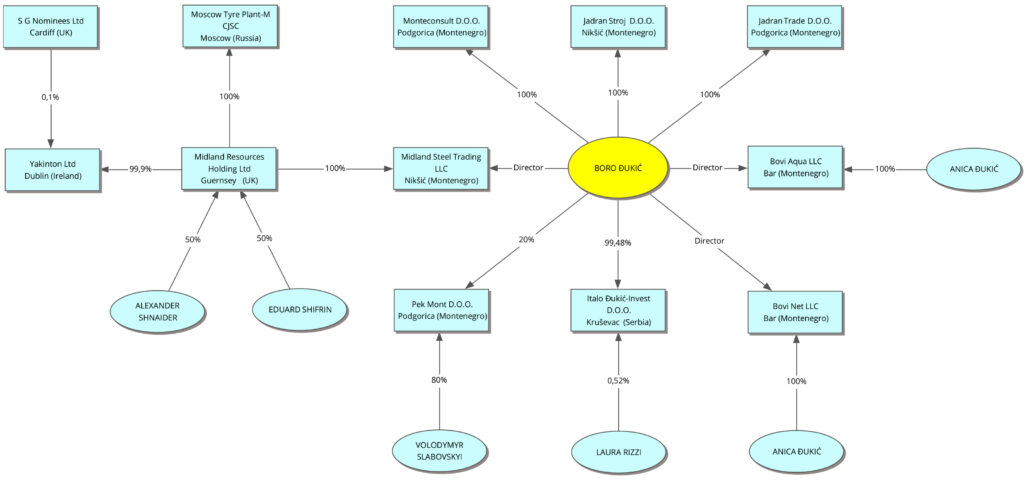
JPN024
[1] https://balkaninsight.com/2016/08/18/russians-own-every-third-company-in-montenegro-report-08-17-2016/
[2] https://gradskeinfo.rs/crna-gora-zbog-sankcija-gubi-turiste-iz-rusije-06-04-2022/
[3] https://www.imf.org/en/News/Articles/2015/09/14/01/49/pr077
[4] https://www.nato.int/docu/update/2006/12-december/e1214a.htm
[5] https://www.eeas.europa.eu/montenegro/european-union-and-montenegro_en?s=225
[6] https://www.nato.int/cps/en/natohq/news_125370.htm
[7] https://balkaninsight.com/2017/04/28/montenegro-approves-nato-membership-amid-protest-04-28-2017-4/
[8] https://www.nato.int/cps/en/natohq/news_144647.htm
[9] https://balkaninsight.com/2016/10/17/djukanovic-wins-montenegro-s-elections-amid-complaints-of-violations-10-17-2016/
[10] https://www.balkancrossroads.com/balkans-should-beware-of-putins
[11] https://balkaninsight.com/2016/10/21/bratislav-dikic-alleged-mastermind-of-montenegro-s-coup-10-20-2016/
[12] https://www.in4s.net/djukanovic-bozovic-i-pokusaj-drzavnog-udara/
[13] https://www.standard.co.me/politika/djukic-stavio-na-racun-56-miliona-eura-pukovnik-fsb-a-mu-posredovao-u-vracanju-zajma-od-22-miliona-eura/
[14] https://www.theguardian.com/world/2018/aug/12/ex-cia-officer-faces-arrest-over-alleged-montenegro-coup-plot
[15] https://abcnews.go.com/International/americans-helped-100-iraqi-christian-refugees-escape-isis/story?id=35783650
[16] https://balkaninsight.com/2023/04/10/defence-to-offer-secret-files-evidence-in-montenegro-coup-plot-retrial/
[17] https://www.aljazeera.com/news/2019/5/9/russian-spies-found-guilty-of-montenegro-coup-attempt
[18] https://balkaninsight.com/2023/04/10/defence-to-offer-secret-files-evidence-in-montenegro-coup-plot-retrial/
[19] https://www.transparency.org/en/countries/montenegro
[20] https://www.nsf-journal.hr/online-issues/focus/id/1351
[21] https://www.occrp.org/en/troikalaundromat/how-russian-blood-money-flowed-into-montenegro
[22] https://www.vijesti.me/vijesti/politika/224585/boro-dukic-pocasni-konzul-rusije-u-budvi
[23] https://pvnovine.com/pocasni-konzul-rf-u-crnoj-gori-boro-djukic-po-povratku-u-crnu-goru-organizovacu-pokret-savez-pravoslavnog-naroda/
[24] https://thegeopost.com/en/analysis/pro-publica-and-icij-shadowdiplomats-in-the-balkans/
[25] https://istories.media/news/2022/12/04/lyubiteli-rossii/
[26] https://www.vijesti.me/vijesti/politika/224585/boro-dukic-pocasni-konzul-rusije-u-budvi
[27] https://istories.media/news/2022/12/04/lyubiteli-rossii/
[28] https://www.sajkaca.com/aktuelne-vesti/ti-si-nesto-najgore-sto-se-desilo-ovako-je-marko-milacic-cestitao-rodjendan-nato-paktu-video/5846/
[29] https://www.politika.rs/scc/clanak/378080/Region/Milacic-ispred-spuskog-zatvora-zapalio-zastavu-NATO
[30] https://sputnikportal.rs/20190404/milacic-nato-obelezavanje-1119355030.html
[31] https://istories.media/news/2022/12/04/lyubiteli-rossii/
[32] https://istories.media/news/2022/12/04/lyubiteli-rossii/
[33] https://istories.media/news/2022/12/04/lyubiteli-rossii/
[34] https://www.firstpost.com/explainers/vladimir-putins-angels-who-are-the-night-wolves-the-russian-motorcycle-gang-that-novak-djokovics-father-posed-with-12054902.html
[35] https://balkaninsight.com/2020/01/17/russian-night-wolves-bikers-support-montenegro-church-protests/
[36] https://thegeopost.com/en/analysis/pro-publica-and-icij-shadowdiplomats-in-the-balkans/
[37] https://ilpiccolo.gelocal.it/trieste/cronaca/2016/11/12/news/i-cosacchi-dei-balcani-nel-mirino-dei-pm-1.14401745
[38] https://www.nsf-journal.hr/online-issues/focus/id/1351
[39] https://www.ft.com/content/f2fcba3e-65be-11e2-a3db-00144feab49a
[40] https://www.codastory.com/lgbt-crisis/unholy-alliance/
[41] https://www.facebook.com/jelka.novogodisnja.5
[42] https://www.facebook.com/photo?fbid=338928740223541&set=ecnf.100023192536952
[43] https://ridl.io/moscow-s-fight-against-the-enemies-of-orthodoxy-in-the-balkans/ ; https://www.balcanicaucaso.org/aree/Montenegro/Montenegro-identita-nazionale-religione-e-politica-198791
[44] https://www.facebook.com/jelka.novogodisnja.5/posts/pfbid0DtpT4Dyfah6hru1outATXxaqNGSxMWrTGqvK3T2LxCn6t14PHth2CxTM5sGxNDzMl
[45] https://sputnikportal.rs/20180329/rusija-konzulat-podgorica–1115088372.html
[46] https://www.bbc.com/news/world-europe-43291394
[47] https://www.reuters.com/article/uk-britain-russia-expulsions/britain-expels-23-russian-diplomats-over-chemical-attack-on-ex-spy-idUKKCN1GQ1QG
[48] https://ria.ru/20180328/1517456544.html
[49] https://www.vecernji.hr/vijesti/crna-gora-protjeruje-ruskog-diplomata-1235736
[50] https://www.pobjeda.me/clanak/bivsi-konzul-rusije-dio-organizacije-protesta
[51] https://rtcg.me/vijesti/drustvo/269912/zaplijenjeno-100-laznih-ipa-iskaznica.html
[52] https://central.asia-news.com/en_GB/articles/cnmi_ca/features/2020/07/13/feature-01
[53] https://rtcg.me/vijesti/drustvo/269912/zaplijenjeno-100-laznih-ipa-iskaznica.html
[54] https://radiosarajevo.ba/vijesti/regija/pale-lazne-policijske-iskaznice-pobjegao-ruski-konzul-dukic/368298
[55] https://sputnikportal.rs/20200309/crna-gora-raspisala-poternicu-za-bivsim-pocasnim-konzulom-rusije–1122006274.html
[56] https://www.srpskoujedinjenje.com/novosti/boro-djukitsh-borite-se-protiv-naroda
[57] https://sputnikportal.rs/20200309/crna-gora-raspisala-poternicu-za-bivsim-pocasnim-konzulom-rusije–1122006274.html
[58] https://sputnikportal.rs/20200309/crna-gora-raspisala-poternicu-za-bivsim-pocasnim-konzulom-rusije–1122006274.html
[59] https://iz.ru/1244046/svetlana-kuzina-tatiana-baikova-roman-soldatov/v-dolg-sluzhbe-kak-v-dele-soobshchnika-polkovnika-zakharchenko-poiavilsia-inostranetc
[60] https://iz.ru/1244046/svetlana-kuzina-tatiana-baikova-roman-soldatov/v-dolg-sluzhbe-kak-v-dele-soobshchnika-polkovnika-zakharchenko-poiavilsia-inostranetc
[61] https://adria.tv/preporuceno/ruski-sud-donio-oslobadjajucu-presudu-u-slucaju-bora-djukica/
[62] https://www.pobjeda.me/clanak/pale-lazne-policijske-iskaznice-pobjegao-ruski-konzul-dukic
[63] https://iz.ru/1244046/svetlana-kuzina-tatiana-baikova-roman-soldatov/v-dolg-sluzhbe-kak-v-dele-soobshchnika-polkovnika-zakharchenko-poiavilsia-inostranetc
[64] https://it.euronews.com/2023/06/12/elezioni-in-montenegro-vince-il-partito-europeista-di-milojko-spajic

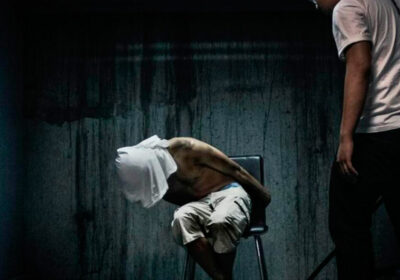
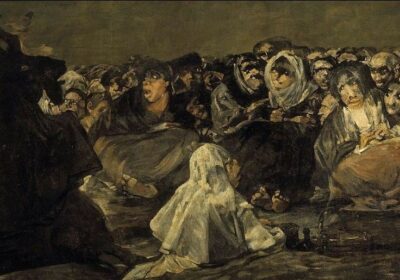
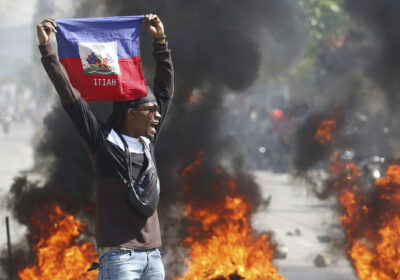
Leave a Reply